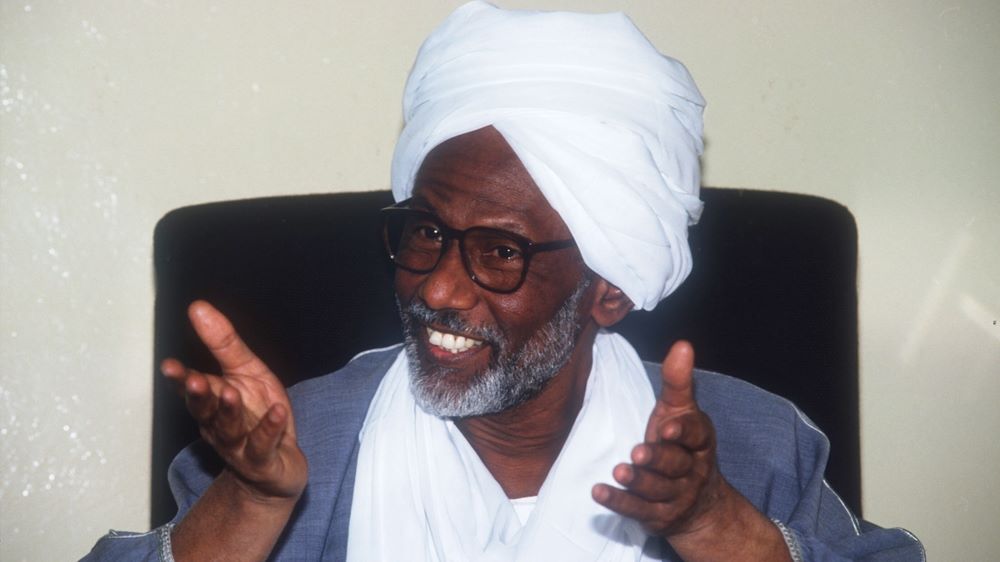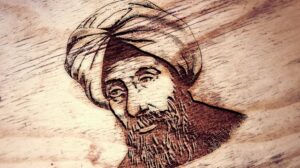
[Photo credit: Al Jazeera/Getty]
Turabi on The Critical Language That Shape Muslim Politics
By Ebrahim Rasool
In the previous column, in tribute to Shekh Yusuf al Qaradawi, I recounted his contribution during the Arab Spring when societies had to conceptualise their futures. This was at the Politics and Ethics Seminar in Doha convened by the Research Centre for Islamic Legislation and Ethics. In that column I raised the five fundamental freedoms he identified: Freedom of expression and opinion; of belief and religion; of thinking; of choice and the right to collective decisions; and to oppose tyranny and wrongdoing.
In that same seminar, Sheikh Hassan al Turabi complemented the Scriptural Discourse of Qaradawi with a linguistic masterclass to mine the critical Arabic language in the battle for meaning and interpretation in Islam, if we are to move the Muslim lived experience from, by and large, a combination of authoritarian forms of governance, conflict and hostility from various sources, the absence and denial of rights and freedom, discrimination, as well as forms of intra-Muslim intolerances like ambiguity around women’s rights, sectarianism, ethnic chauvinism and regional powerplays, towards a qualitative change in the lives of Muslims. For this to happen, Turabi insisted that we must get to the etymology of the critical language that shape Muslim political behaviour.
The following are some of the critical concepts that he mined for meaning:
Siyāsa: the Arabic word used for politics and policy, derives from how one cares for one’s animals and therefore, in its modern application would mean the proper administration of public affairs, the systematic management or the correct policy approach to systems (health, education, economics, etc). Dr Hassan al Turabi says, therefore, that a siyāsi or politician refers to “A wise person who is skilled at managing public affairs…”. The operating objective of politics is the best policy and the most systematic and beneficial ways of public management.
Shariah: Again Turabi delves into the multiple derivatives of the concept Shariah. Shara’a he suggests means ‘to arrive, open or clarify’ while mashrasuggests the ‘ultimate destination’ and shāri means street’ or way. The combination of these could, therefore, accord with shariah meaning the way to the water or destination, and elaborated would imply the guiding directives and, Turabi argues, ‘… some of these laws are meant to address the human conscience…’ while others address the community of believers so that they might abide by the commands, avoid prohibitions …’. The operating objective is that Shariah, rather than being a system of punishments and the form of a state, is actually a guide or a way to the destination.
Shura: The word Shuraderives from the root shawr meaning advice, and could mean ‘one side seeking advice’ – as in istisharah; or mutual consultation – tashawur; while Shura envisages an inclusive and equal participation in decisions. In this latter meaning the assumptions of freedom and justice make this meaning the root for its national political application, without exclusions. The word Shura is explicitly mentioned in the Qur’an, an obligation for the head of state to take counsel and a right for the community. The unanimous opinion of the majority of Muslim jurists is that the Shura is obligatory on both those in authority and for members of the Muslim community. The goal is to make a more informed decision by taking into account all constraints, threats, opportunities, and other relevant factors. “The Hanafi jurist Abu Bakr al-Jassas listed the advantages for Shura – the principle of collective deliberation, using autonomous reason, allows a clear decision on the unresolved situations of the sacred texts – it highlights the legitimacy of the Companions of the Prophet, who had control of autonomous reasoning – – It legitimizes the use of autonomous human reasoning “.[1] Shura in Islam, therefore, is a principle and objective of politics, and not necessarily a system, but would mean that a system that fulfils the objective – such as democracy – could be considered, because it is the antidote to authoritarianism.
Dawlah Madānīyyah – Turabi traces the word dawlah to its Arabic root which means “two things happen one after the other in a repeated pattern. It also means circulation of …wealth or authority”. Its common English translation is ‘state’, but unlike the Western ‘state’ that denotes stability, the Arabic denotation is dynamism and change. Dawlah or state is the noun accompanied by an adjective that – we now assume to be Madānīyyah. Again Turabi explains how the root word madani originally meant a distinction of rural from urban, but that in its development to describe how to co-exist in urban settings, it became a worddescribing legal transactions – hence the evolved meaning of ‘civil’ as in civil (not criminal) law, or civil service (delivering services to people) or civil engineering (infrastructure serving public needs) or even civil war (conflict amongst the inhabitants of one space), etc. Dawlah Madānīyyah– the Civil State – is not necessarily an antithesis to the Islamic State, but it is a state that is oriented to public service, in service to the people or citizenry, from whom, through shura, it derives popular legitimacy.
Al Adl– the Arabic word for Justice. The Islamic tradition contains deep commitment to justice that is rooted in God’s divine nature. The Qur’an states, “Verily, God does not do even an atom’s weight of injustice” (Quran 4:40). In a Hadith Qudsi (Prophet’s saying quoting God), the Prophet Mohammed reports God as saying, “ O My servants, I have forbidden injustice upon myself and have made it forbidden amongst you, so do not commit injustice.”[2] Justice is one of the main pillars of governance in Islam. It entails equality, equity in allocation and distribution where all members of society benefit, and fair governance of people according to mutual consultation (Qur’an 42:38). It is exercised through an independent body designated by the Emir. According to the medieval jurist, Ibn Taymiyyah, “God upholds a state established on justice, even if it were a nation of disbelievers, and would not uphold a state established on injustice, even if it were a nation of Muslims… This world lives with justice and disbelief and does not live with injustice and Islam.” The Prophet stated: “No sin has a faster Divine punishment than the sin of injustice…. Thus, people of injustice fail in this life, even if they were to be forgiven in the hereafter. This is because justice is the universal law of things.”[3] Therefore, it is obligatory to protect the rights of all people irrespective of their status.
The linguistic work of Sheikh Hassan al Turabi indeed advances the discourse of Strategy & Statecraft in the Muslim world and can certainly help us transcend the inherited politics of authoritarianism.


